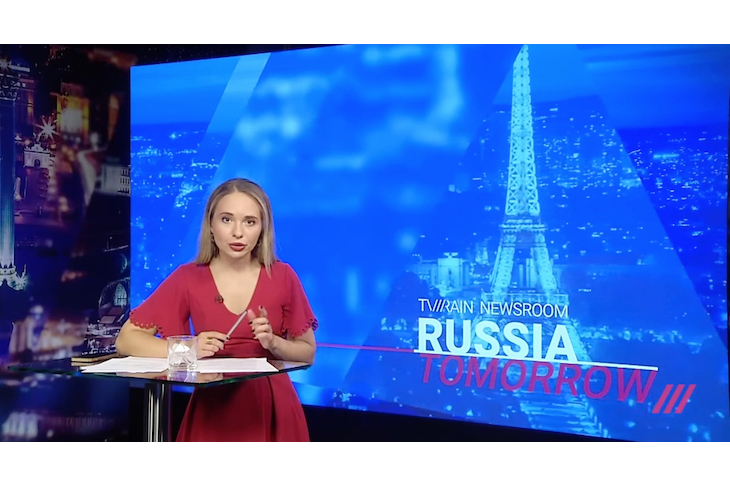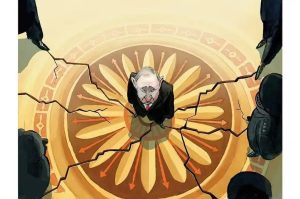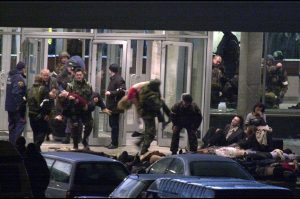“Ukrainians fight for their homeland, Russians fight for Putin’s ambitions,” declared the TV presenter on his YouTube channel earlier this year. This was not a Ukrainian propagandist. In fact, the commentator was Russian and talking on “TV Rain,” the most popular and effective opposition channel broadcasting into Russia.
In TV Rain’s final program from Moscow before the station was forced to shut down and move abroad, the founder declared: “No to war. Putin cannot win the war.” In exile, the channel remained robust. “The war has no justification and has to be stopped,” says the editor Tikhon Dzyadko. “Russia must withdraw its troops from Ukraine.”
The most effective vehicle of mobilising opposition to the war in Russia is likely to go bankrupt because of sanctions
Last July and during one week in September, at the time of partial mobilization of the Russian people, the channel received an estimated 50 million views and broadcast news into Russia for up to five hours a day.
And yet western sanctions are threatening TV Rain’s economic viability and its existence. The channel is losing an estimated $1.25 million a year in potential revenue from its YouTube platform because sanctions mean it cannot monetize advertisements viewed by its Russian audience. The lack of advertising revenue now threatens TV Rain’s ability to function.
The all-encompassing nature of the sanctions has resulted in YouTube suspending all monetization programs for users in Russia, leaving TV Rain dependent on its minuscule non-Russian audience for advertising income. Vera Krichevskaya, the co-founder, spoke to YouTube executives about the rigid sanctions but the company and the UK government are not prepared to be flexible. “We are the only source of TV information in Russia that wants to stop this war and fight the brainwashing,” she said. “We just asked them to help us. They said the market is canceled in Russia and all the companies that placed commercials in Russia have left due to sanctions.”
“I find it very strange that when the West goes on about the importance of freedom of speech and western European values, a company like Google has no flexibility. They give us zero income and zero profit on Russian audiences, making it near impossible to operate.”
And so the most effective vehicle of mobilizing opposition to the war in Russia is likely to go bankrupt because of sanctions imposed without any thought about their economic impact. The financial consequences of blanket sanctions for the West are now a major issue and there is a debate about whether the economic war is working.
Some analysts argue the sanctions are successful and damaging the Russian economy. A study by Yale University concludes that Russian government financial statistics are distorted and selective. The Yale analysis of real-life market data on volumes of oil and gas actually traded reveals that Russian energy export revenues dropped to $14.9 billion — less than half of what they were in the first month after the invasion. And Russian domestic production has come to a complete standstill. “Kremlin finances are in much more dire straits than conventionally understood,” concluded the Yale study.
But the collateral damage of sanctions to the West’s economy is enormous. By August 2022, it cost global corporations $59 billion. “Globalization has increased the economic costs of using sanctions against large economies and also made them easy to circumvent,” said Vaibhav Tandon, vice president of Global Risk at Northern Trust. “The more they are used, the less effective they become.”
The issue is whether the damage to western companies caused by sanctions is worth it. “Putin will not shed a tear if the US and UK shut down a Dutch bank staffed by European employees,” said Matt Kus, head of lending under at the FIBR brand. “Sanctions are a great and necessary tool, but I wish the UK and US gave more thought to the secondary and tertiary effects to simply sanctioning the richest Russians and Russian private banks around the world.”
For some Russian businessmen the price of sanctions is not worth paying. “The reality is that Russia has survived the shock of sanctions, regrouped and rallied,” said Damian Kudryavtsev, an active and hostile opponent of Putin’s regime. “Sanctions have not destroyed its economy, just as they did not destroy the economies of other authoritarian regimes, nor did they lead to the dismantling of those regimes.” Instead, he argues: “Russia is looking for — and finding — new markets.”
That new market is, of course, China which is the chief beneficiary of sanctions and a weakened Russia. “The sanctions policy should be renamed the Beijing Economic Recovery Act because it benefits China hugely and cannot be overestimated,” said the lawyer Bob Amsterdam who has worked in Russia for many years.
Since the Ukraine war started Chinese trade with Russia has increased by almost a third to a record $190 billion. Sanctions have resulted in Russia increasing oil and liquefied natural gas to China, second only to Saudi Arabia. Russia now has a trading surplus of $38 billion with China. A weak Russia means a strong China who will also cash in on reconstruction contracts in Ukraine.
Unless the sanctions are more selectively implemented, the collateral economic damage will be immense. The irony of Putin’s enemies being sanctioned is not lost on TV Rain whose revenue stream has been almost destroyed. One of their YouTube videos was headlined “How Putin Deceives Millions of Russians.” As the editor Tikhon Dzyadko commented in frustration: “I don’t know how we could be more anti-war.”
This article was originally published on The Spectator’s UK website.

























